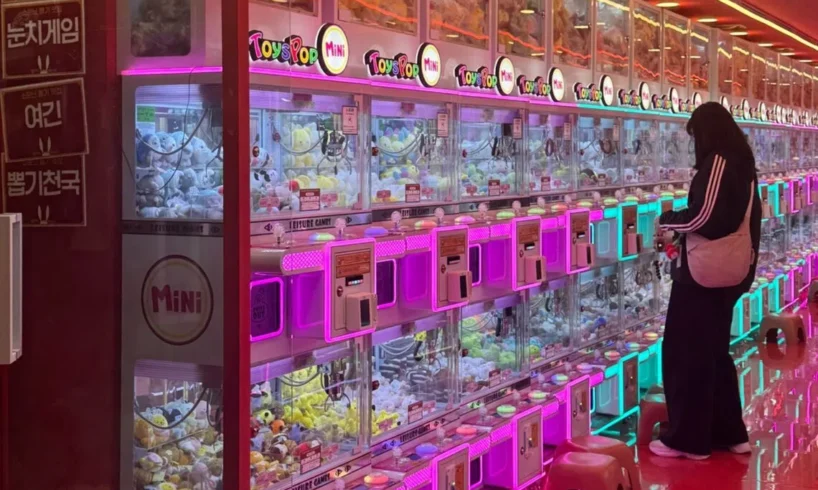
SEOUL – In an age of instant dopamine hits, more Koreans are chasing quick thrills through toy vending machines, or gacha – games of chance that keep them coming back for more.
For about 5,000 won (S$4.50) to 10,000 won a spin, each turn of the handle dispenses what is known as a gachapon, a plastic capsule containing either the object of desire or a small disappointment, followed by the inevitable dopamine crash.
Across the country, malls, arcades and even subway stations have embraced these vending fantasies of suspense and luck so much so that Koreans coined a word for it: poppamine, a portmanteau of dopamine and ppobda, meaning “to pull something out” in Korean.
The poppamine trend shows how anticipation has evolved into enterprise, now large enough to stand on its own in retail. According to industry estimates, Korea’s gacha market, valued at 10 billion won in 2022, expanded fivefold to 50 billion won in 2024.
Go-to hubs for such games include I’Park Mall and AK Plaza, which have readily embraced Japanese anime and gaming culture to attract crowds of avid collectors.
At I’Park Mall’s Yongsan branch, nearly 1,000 capsule machines line the corridors across its various gacha zones, including Gacha Park, Gacha Land and the Bandai Namco Korea Store, which alone houses 355 machines featuring the company’s full line-up of character franchises.
The mall’s gachapon sales reached 1.7 billion won in August, up 13 per cent from July, and climbed to around 2 billion won in September. Gacha Park alone brings in over 300 million won each month.
“The lasting appeal seems to come from the sheer variety of capsule toys inspired by popular characters,” said an I’Park Mall official, noting that women in their teens and twenties make up most of the customers.
Experts say the trend reflects how fun has become central to consumption among younger generations, who relish the thrill of unpredictability and the satisfaction of finally getting what they want.
The craze has leapt from department stores to supermarkets and convenience stores, as seen in Lotte Mart’s installation of gacha machines at more than 110 of its toy store locations nationwide. “We operate a mix of both domestic and Japanese products,” said a Lotte Mart official.
GS25 followed suit in May, operating Ichiban Kuji kiosks, a sure-win lucky draw for anime figures, at select stores across Seoul. CU, which introduced capsule-toy kiosks in February, has since expanded them to more than 70 stores nationwide.
Industry insiders say the charm of these vending machine games lies in their efficiency. “They require almost no labor, take up little space, and keep customers hanging around, thus transforming idle corners into profit-generating zones,” one industry insider noted.
Koreans are no strangers to vending-machine games built on anticipation and surprise.
Many share the experience of steering the joysticks of UFO catchers at arcades, trying to seize a plush toy with a claw that always seems to let go at the last second. While the psychology behind claw machines mirrors that of gacha machines, it offers a sense of control over what players might win, with the thrill lying in the almost.
Riding the poppamine wave, claw machines have multiplied across the country, glowing in neon and evolving into mini versions that dispense tiny plush charms, feeding Korea’s love for decorating.
According to the Ministry of the Interior and Safety, 987 new arcade licences, which include claw-machine shops, were issued nationwide between January and August this year, more than double the 411 from the same period last year.
The trend of using cute trinkets as self-expression remains a national pastime, with many accessorizing handbags and phone cases with fluffy dolls and miniature collectibles.
“Affordable bag charms allow young consumers to express their individuality without financial strain,” said Professor Lee Eun-hee, who teaches consumer studies at Inha University.
Yet, the proliferation of claw machine arcades has recently sparked concern that what appears to be harmless entertainment may, in fact, border on probability-manipulated gambling.
During a National Assembly audit of the National Gambling Control Commission on Oct 20, Mr Jin Jong-oh of the People Power Party pointed to a widening blind spot in gambling regulation and a lack of clear responsibility for the multiplying number of claw machine parlours.
“The claw may look flimsy, but it’s cleverly engineered to spark the urge to try again, keeping players feeding in more money,” he said.
“The machines are not simple entertainment, but probability-based games with a clear gambling element.”
In response, Mr Shim O-Taeg, chair of the commission, acknowledged that the games carry elements of gambling.
“We are approaching the issue from a supervisory standpoint,” he said. THE KOREA HERALD/ASIA NEWS NETWORK





